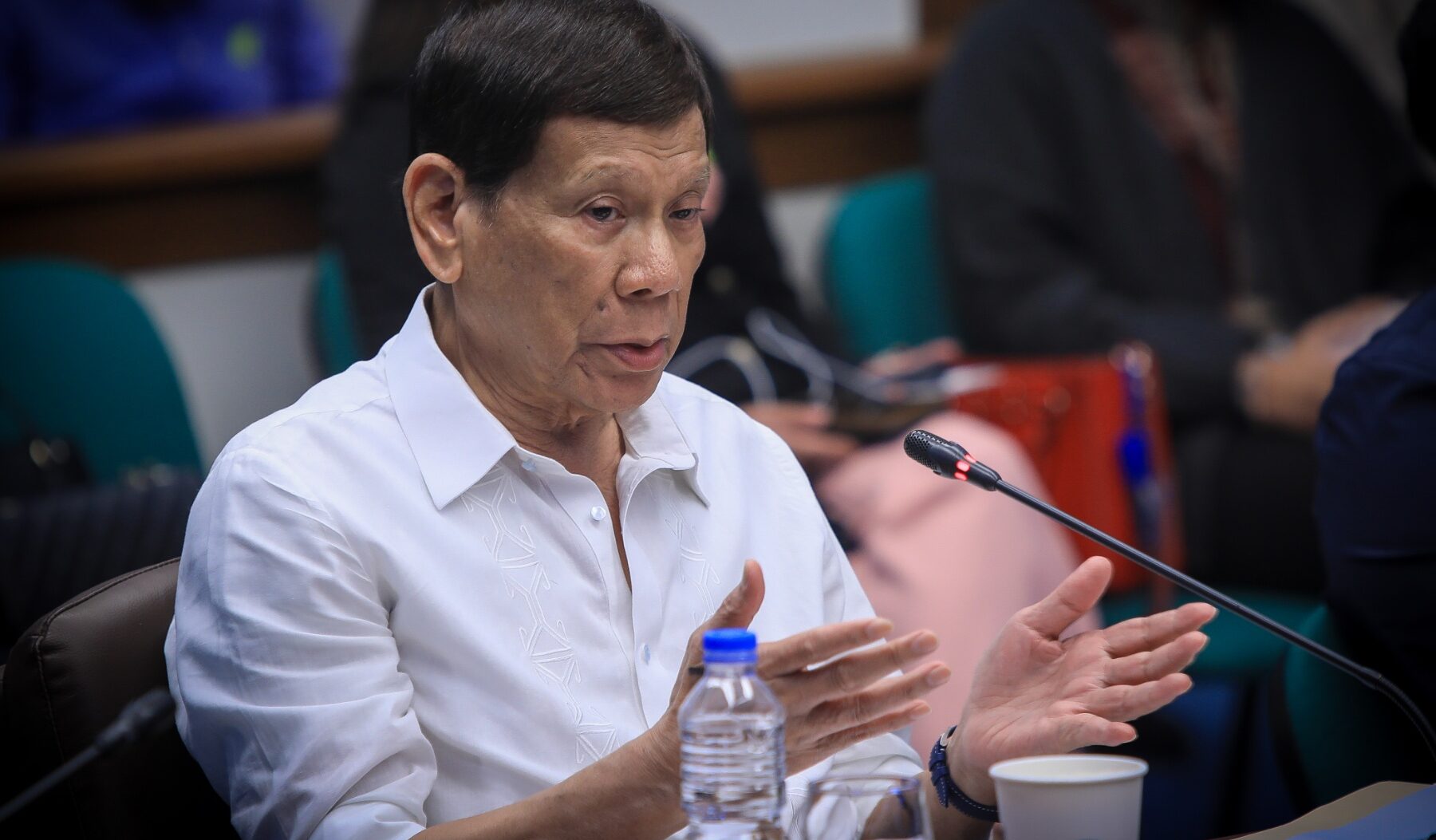
FPRRD TESTIFIES BEFORE SENATE PANEL: The Senate Blue Ribbon Committee secretary administers the oath of former President Rodrigo Roa Duterte Monday, October 28, 2024 before he begins his testimony before the subcommittee investigating motu proprio the alleged extra-judicial killings during his administration. In his opening statement, Duterte defended his war against illegal drugs, which he said was not about killing people but about protecting the innocent. “My mandate as President of the Republic was to protect the country and the Filipino people. Do not question my policies because I offer no apologies or excuses. I did what I had to do,” the former chief executive said. “My job as President was never easy… I have tried to do the best I can to address the problem of illegal drugs firmly and without compromises. For all of its successes and shortcomings, I, and I alone take full legal responsibility,” he added. (Senate Public Relations and Information Bureau)
Llore Pasco found it insulting to hear former president Rodrigo Duterte not only defending his deadly war on drugs but also exuding pride in its results.
To Pasco, who counts her two sons among the thousands killed in questionable police operations during the six-year crackdown, the 79-year-old man who faced the Senate on Monday, where he again unloaded expletive-laden spiels about defending the country against criminals, showed no sign of remorse “because he sees the poor as mere animals.”
“He has no care, no heart for us,” she said. “In his eyes, we are useless, offering him no benefit. So he thinks it’s all right to just have us killed.”
Speaking at a press conference on Wednesday, two days after Duterte’s historic appearance in a Senate inquiry revisiting his drug war, Pasco said she was particularly struck by an exchange between the ex-president and Sen. Risa Hontiveros.
Asked by Hontiveros whether the drug suspects who were killed—mostly in police raids conducted in shantytowns and with no formal charges filed against them—deserved their fate, Duterte said he would rather spend money for people in need than waste it on food for jail inmates.
Pasco faced the media also as a member of Rise Up for Life and Rights, a Church-backed alliance extending various forms of assistance to families left grieving by the drug war.
Crisanto and Juan Carlos
In the hope that Duterte would soon have his day of reckoning, Rise Up has been giving a voice to the likes of Pasco, who lost her sons Crisanto and Juan Carlos in May 2017.
The brothers had gone missing for a day before she saw a TV report saying they were killed in a police operation against “robbery” suspects.
At the time, Crisanto was a 34-year-old security guard, and Juan Carlos was a 31-year-old contractual worker for a power utility.
“They had a witness shown on TV accusing (my sons) of being robbers and that supposedly there were police officers who passed by and saw them (committing robbery), and that the victim cried for help,” Pasco recalled in an Inquirer interview.
The supposed “encounter” happened at the UP Arboretum or the forested area inside the Diliman campus of the University of the Philippines.
According to the autopsy, both brothers were shot at least seven times, she added.
The mother would hear none of the robbery allegations. Instead, she offered another explanation of why her sons became targets in the drug war.
‘Tokhang’ lists
Days before they were killed, Pasco said, Crisanto and Juan Carlos came forward to have their names “cleared” by the village government, which had been ordered to come up with a list of known drug users or peddlers in the locality.
The compilation of such barangay “watch lists” was one of the main features of the now-notorious “Oplan Tokhang” of the Duterte presidency.
“Every barangay had informants who knew the drug users and pushers in the area. My sons were only small-time users but not pushers,” she said. “They went to the barangays to clear their names.”
“We later found out that those listed by the barangay later disappeared and then turned up dead,” Pasco said.
On the day Duterte faced the lawmakers, Rise Up members gathered in what may be their most emotionally charged mass action yet, holding a rally outside the Senate building.
‘Let ICC come in’
“We, the families of those who were killed, are dismayed because until now we have yet to achieve justice,” she said. “We cannot just file cases against him (in the country) because he has a lot of allies. That’s why we are asking to let the ICC (International Criminal Court) come in and investigate. Let’s see where this pride would take him.”
Rey Cortez, a member of the National Union of People’s Lawyers, said Rise Up families still had to rely on their own resources to pursue criminal cases against the police. To have any real chance of scoring a conviction, “they have to gather their own evidence, get their own forensic expert.”
To begin with, “it is difficult to get documents from the police themselves, such as investigation and autopsy reports,” Cortez added. “Worse, the prosecutor assigned to the case [would sometimes] testify in defense of the police.”
He cited the case of Luis and Gabriel Bonifacio who were killed in 2016 during an antidrug operation at their home in Barangay Bagong Barrio, Caloocan City.
Cortez recalled that during the trial, their family members revealed they were asked to sign a “waiver” that would let them take the bodies home if they promised not to press charges against the officers involved in the operation. INQ

